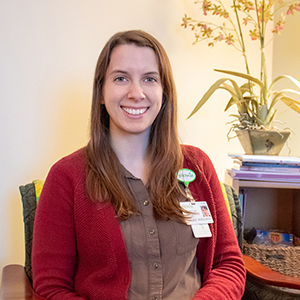Supporting Elderly Patients and Their Families

Through Gilchrist’s Elder Medical Care program, social workers and resource coordinators provide ongoing emotional support and resource coordination at no cost to patients and families facing a serious illness. This support helps elderly patients and families who may be overwhelmed and want assistance in coping, care coordination and planning for the future.
The social worker and resource coordinator work closely together in supporting patients and families. The social worker is a master’s-prepared licensed clinician who provides emotional support, aids in coping skills, and assists families in working through challenges. The social worker can also assist in advance care planning, such as completing advance directives and deciding on medical interventions.
Safety planning is another role of the social worker, as many patients realize they require more help in their homes as their illness progresses. Additionally, the social worker can discuss requirements for the hospice program and assist families in evaluating when it is time to transition to hospice care.
The resource coordinator is a skilled navigator of the services available in the community and through government agencies, such as the Department of Aging and the Department of Social Services. The resource coordinator can discuss the criteria for certain assistance programs with families and provide hands-on assistance in the application process.
The resource coordinator can also assist a family in navigating long-term care should the need arise. Many families are overwhelmed and want practical assistance, but don’t know where to start. Our resource coordinator fulfills an important role in navigating a complicated system.
The social worker generally establishes care with a visit to the patient’s home to learn about the patient and family and find out what is most important to them. From this visit, the social worker may make a referral to the resource coordinator if the need is present.
The social worker, with the help of a Gilchrist volunteer, makes monthly calls to the patient or caregiver to evaluate the patient’s status and provide ongoing support. Families and patients are also encouraged to call the social worker if challenges surface. The social worker is available to visit the home again if needed.
Many of the Elder Medical Care patients receiving emotional support and resource coordination also receive medical care at home from a Gilchrist nurse practitioner. The criteria for entry into the program is an advanced disease diagnosis, such as dementia, cancer or COPD (chronic obstructive pulmonary disease).
As a social worker in the Elder Medical program, I serve an important role for families as they navigate illness. For many elderly patients and families dealing with advanced illness, just knowing Gilchrist is involved and providing ongoing support is a great relief.


